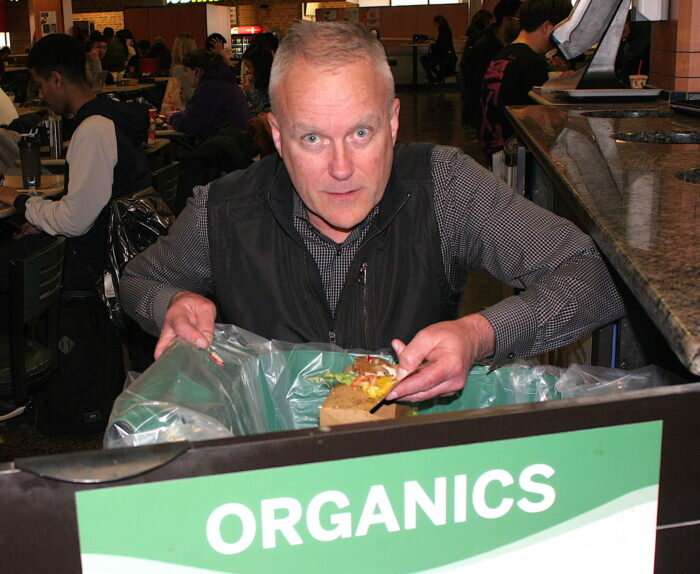Food waste costs not appetizing to many

Wasting food has become a way of life for many Londoners who, according to one Western-led study, are tossing an average of $600 into the trash every year.
While the data comes from surveying 1,300 households in just one city, the trend is almost certainly echoed in communities across Canada, explained Paul van der Werf, an environmental consultant and project advisor with Western's Human Environments Analysis Laboratory (HEAL Lab).
Van der Werf served as lead author of the paper "Food for naught: Using the theory of planned behaviour to better understand household food wasting behaviour," newly published in Canadian Geographer.
"London is a mid-sized city with a an 'average' population. If we want to look at Hamilton, Saskatoon, Vancouver, maybe some of their answers would be different. But I don't think they would be that different; this is quite replicable," he said, noting a Swiss study with similar methodology had similar findings.
The survey of London households showed residents reported throwing out food – what's called 'avoidable food waste' – on average 4.77 times per week for a total of 5.89 food portions in the previous week. Fruit and vegetables were tossed most often, and usually because respondents said they had bought more than they needed and it had spoiled.
Just 11 per cent of respondents said they hadn't thrown out any food in the previous week.
Van der Werf also examined what might push them to waste less. While environment and social responsibility were on the list, respondents believed saving money would be a primary driver to changing their behaviour.
"My hypothesis was that people are motivated by money – as crass as that might seem and as much as we like to think people are primarily motivated by environmental impact and the social good."
People don't feel they have control over environmental impact and the social good; their good intentions aren't enough to persuade them to toss less food. However, they do have control over their money – and not wanting to throw away the $31 billion per year in food Canadians are estimated to waste.
"I'm a big believer in using local data to motivate change. When people hear the word 'billions' – that's too much. They're not billionaires so they can't relate. But when I say to them, on average, households throw out $600 per year, that's a lot of motivation."
When asked to choose from among three motivators to stop food-wasting behaviour, 60 per cent of respondents chose reducing monetary loss as the best incentive.
Unlike many Canadian municipalities, London doesn't yet have a city-wide green bin program to collect and compost food waste.
Western has a composting program and an organics collection system in residences, at the University Community Centre (UCC) Centre Spot, in the Support Services Building and several other buildings as part of the university's aim to become a Zero Waste Campus.
Green bins deal with only the end part of the problem, van der Werf said. While composting diverts food from the landfill, "It's still food you should have eaten."
About 75 per cent of the environmental impact of food – all the work that goes into growing, processing, warehousing, shipping and distributing, for example – takes place before it lands on our plates. That means composting, while laudable, won't have as big an impact as just buying less and using more.
"To me, the message needs to remind people that food waste is an inefficiency. We need to re-rationalize that green bin a little bit to emphasize that first 'R' – reduction. If we can manage our food provisioning, storage and preparation, then it would improve our sense of control over the situation."
The study is co-authored by HEAL Lab director and Geography professor Jason Gilliland and Brescia University College professor Jamie Seabrook of the School of Food and Nutritional Sciences. It took place in co-operation with the City of London's director of Environmental Services, Jay Stanford.
With recruitment taking place through social media, the city, community groups and even through hand-delivered flyers in some areas, the study drew respondents from a representative sampling of London neighbourhoods and demographics.
Van der Werf, who earned his Ph.D. in Geography last November and is primarily a waste management consultant, is conducting a new academic study to examine and compare self-reported waste volumes with the actual amount of waste and recyclables/compostables placed at curbside.
More information: Paul van der Werf et al. Food for naught: Using the theory of planned behaviour to better understand household food wasting behaviour, The Canadian Geographer/Le Géographe canadien (2019). DOI: 10.1111/cag.12519
Provided by University of Western Ontario


















